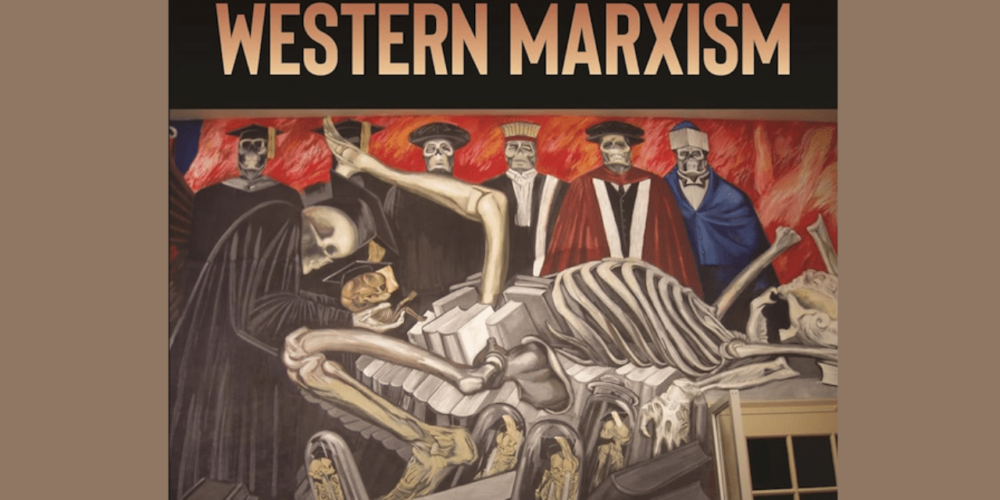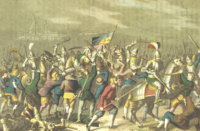Western Marxism (WM) by Dominico Losurdo, translated into English and published recently by Monthly Review, is an important work exposing the idealism, pro-imperialism and eurocentrism (i.e. the paternalistic approach towards struggles in the periphery) of western Marxists. In the introduction, the book explains that WM is not a geographical orientation but a political orientation, which means WM is different from Marxism in the West. WM is a trend which developed when an uneven development of capitalism that took place due to imperialism, thus a stratification of the world into developed and under-developed countries. WM is the cultural production of the imperialist core,where the bourgeois cultural apparatus promoted WM and produced cultural imperialism. The trend of WM is also a result of the failure of revolution to spread across Europe after the Russian revolution and the withdrawal of intellectuals to theory, abandoning praxis.
The book reasons this eurocentrism as the legacy of Second International (1889-1916) and the imperialistic stratification of the world, with extraction of super-profits creating a labour aristocracy in advanced countries. There can be parallels drawn between this book and “The Proletarian Revolution And Renegade Kautsky” because Kautskyism was opportunism by class collaboration leading to social chauvinism (“defense of the Fatherland”).
Western Marxists, due to their remoteness from power and superficial understanding of class struggle, failed to see the unity of the universal (proletarian internationalism) and particular (national liberation). The book is a rejoinder to Perry Anderson’s book Considerations On Western Marxism (1976), exposing the limitations of WM that is rich in theory but which has no use value in working class struggles because the theory is not drawn from praxis.
The book also exposes the failure of WM to acknowledge the defeat of fascism by the spirited Soviet Union. WM also doesn’t recognize that it was anti-colonial struggles that weakened imperialism. Losurdo also criticises WM for its “workerism” which means concentrating on the class struggle between capitalists and working class in the Metropole without getting distracted by National struggles in the third world (third worldism). Why do Western Marxists take this position? It is because of the alignment of interests of the labour aristocrats with the interests of the bourgeoisie in the core countries, leading to class collaboration and opportunism, which is antagonistic with the interests of the proletarians in the periphery. Losurdo‘s work is to expose this false consciousness.
The book explains through Mao and Ho Chi Minh how class struggle took the form of National Liberation struggle in the colonies which Western Marxists rejected. Ho Chi Minh was impressed by the Third International (1919-1943) which coined the slogan: “Proletarians and oppressed peoples of the world unite”. The destiny of the proletarians of the world is linked to the destiny of the oppressed nations in the colonies. The book also tells how Bolsheviks were castigated as “traitors” of the white race for supporting the anti-colonial struggles and how National Liberation struggles were de-legitimised as fascist in character. Western Marxists failed to grasp the practical importance for newly independent nations to develop their productive forces in order to bridge the gap in technological advance vis-a-vis advanced nations, the failure of which would render them subservient to Imperialism.
This book is important because it exposes these “Marxists” who have great influence amongst university students and academics. Louis Althusser, being a structuralist, said that social structures shape human behavior and history, therefore giving primary importance to understanding power structures rather than to class struggle. These theories give primacy to the superstructure and hold that superstructure is independent of the economic base, which is anti-Marxist and anti-scientific. WM too is deterministic, challenging human agency and denying the significance of human intervention through class struggle.
The Frankfurt school brigade – Adorno, Marcuse, Fromm, Horkheimer, etc. – were busy equating Communism and Nazism. The hypocrisy of Horkheimer was clear when he hailed the English and American revolutions which promoted slavery while criticising the French revolution as “totalitarian” even though it led to the emancipation of slaves in Haiti. Adorno failed to see fascism as a product of capitalism and de-legitimised colonial struggles in Algeria and Vietnam as reactionary. Marcuse failed to see the emancipatory potential of anti-colonial struggles.
The “Marxists” turned a blind eye to imperial aggression during colonialism and genocides in the Americas, Africa and Asia; they had no issues in standing with Israel in spite of its settler colonialism, genocide and ethnic cleansing. The convergence of WM and colonial struggles never happened. Hannah Arendt in the first two parts of The Origins Of Totalitarianism views the Soviet Union in a positive light as a protagonist against Nazism and a supporter of National liberation struggles and criticises Nazism as a dreadful form of Imperialism, but in the third part, with the Cold War as the background she calls Nazism as a twin brother of Communism; erases the link between colonialism and third Reich; and thus a Nazi ideologue like Alfred Rosenberg stating that the South of the US was a model for the German racial state and eugenics was used for racial profiling was forgotten. Hannah Arendt went to the extent of saying that the revolutions of 1848 and the Paris commune were explosions of madness and a lack of common sense.
This book is an eye opener to understand the “Marxists” who convert Marxism into idealism, Eurocentrism and imperialism, with theories that are so complicated they do not have any value in practical struggles. Class struggle is the essence of Marxism: we need to reject theories that reject class struggle. The contradiction between the forces of production and production relations is the basis for the changes that take place in society.






